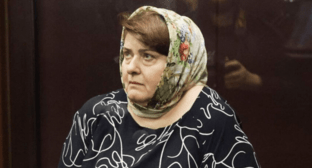20 December 2021, 18:39
Week in the Caucasus: review of main events of December 13-19, 2021
Verdict of guilty against the leaders of the protest in Ingushetia; end of the Azerbaijani activist Salekh Rustamov’s hunger strike; arrival of migrant Rubati Mitsaeva in Chechnya, – see the review of these and other events in the Caucasus during the week of December 13-19, 2021, prepared by the “Caucasian Knot”.
Verdict of guilty against leaders of protest in Ingushetia
On December 15, a court in Yessentuki granted the Prosecutor’s requests to sentence Ingush activists Akhmed Barakhoev, Musa Malsagov, and Malsag Uzhakhov to nine years of imprisonment, Ismail Nalgiev, Bagaudin Khautiev, and Barakh Chemurziev – to eight years, and Zarifa Sautieva – to 7.5 years of imprisonment. Seven leaders of the protest in Ingushetia have been accused of creating an extremist community. In March 2019, at a rally in Magas against the agreement on the Chechen-Ingush border, the defendants were urging the protesters to refrain from riots, and those actions contained no extremism, the defenders said. The human rights organization “Amnesty International” (AI) noted that the case failed to comply with the Russia’s international human rights obligations.
The defence hoped for a lighter punishment. Relatives of the convicts reported that they had lost faith in a fair trial. Seven protest leaders were demonstratively sentenced to long terms of imprisonment for peaceful protests, journalists and political analysts note. The conviction of seven civil society leaders in Ingushetia would dash hopes for the possibility of legal opposition activities in the country, human rights defenders say. In his final speech, Malsag Uzhakhov said that the criminal prosecution of the activists was ordered and falsified.
Meeting of leaders of Azerbaijan and Armenia in Brussels
On December 15, Azerbaijani President Ilham Aliev and Armenian Prime Minister Nikol Pashinyan held talks in Brussels with the participation of European Council President Charles Michel. The leaders agreed to create a working group to delimit the border between the two countries and unblock the railway. According to Azerbaijani experts, the clause on the restoration of railway communication involves the opening of the Zangezur corridor. The European Union made it clear that no extraterritorial corridors are acceptable, political analysts in Yerevan argue. On the eve of the talks, Baku analysts did not rule out armed clashes on the border between Azerbaijan and Armenia. On the eve of the meeting, Ilham Aliev and Nikol Pashinyan exchanged claims. The Zangezur corridor, which Baku is seeking to open, should work on the same conditions as the Lachin corridor, the President of Azerbaijan states. The Prime Minister of Armenia accused the leader of Azerbaijan of trying to lead to a dead end the issue of opening regional communications.
Adoption in first reading of law on QR codes in Russia
On December 16, the State Duma of Russia adopted a bill on the mandatory use in public places of QR codes confirming vaccination against coronavirus. Earlier, the bill was supported by members of regional State Dumas in all regions of Southern Russia. The government and the State Duma should finalize the bill to make it “clear and understandable,” President Vladimir Putin instructs his subordinates.
Almost all regions of Southern Russia imposed a ban on visiting catering facilities, cinemas, fitness centres, beauty salons, theatres, museums, and other cultural and leisure institutions for the people not vaccinated against coronavirus. Starting from December 11, the Volgograd Region prohibits to go on business trips to other regions without a QR code or a PCR test, as well as to receive at points of delivery the goods purchased online. Residents of the Volgograd Region are actively protesting against the QR-code system. However, political analysts suggest that even in this region, the protest actions against QR codes are too few in number, so the authorities will not take them into account. There are also opponents of QR codes in other regions. So, Shamil Khadulaev, the chairman of the Coordination Council of the NGOs of Dagestan, believes that passage using QR codes does not guarantee complete protection against coronavirus infection in public places, as vaccinated people also get sick and can infect others.
End of Azerbaijani activist Salekh Rustamov’s hunger strike
On December 16, Salekh Rustamov, an activist of the Popular Front Party of Azerbaijan (PFPA), ended his hunger strike, which he had been continuing for more than 40 days. The activist was convicted in a case on money laundering, but pleaded not guilty. On November 6, Salekh Rustamov went on a hunger strike to protest against not being granted amnesty. On December 13, he refused water, and on the 14th day of the hunger strike, his health state deteriorated sharply. On the 15th day, Salekh Rustamov agreed to supportive treatment and ended the hunger strike on the 41st day of the protest action. Salekh Rustamov’s hunger strike provoked a wide public outcry, including outside Azerbaijan. The spokesperson for the US Department of State and co-rapporteurs of the Parliamentary Assembly of the Council of Europe (PACE) called on the Azerbaijan’s authorities to release Salekh Rustamov. In Baku, activists held protests in support of Salekh Rustamov, and his relatives and activists began a hunger strike of solidarity. According to an advocate, Salekh Rustamov justified the termination of his action by the fact that he did not want other people to suffer because of him.
Arrival of migrant Rubati Mitsaeva in Chechnya
On December 14, Rubati Mitsaeva, a former associate of Akhmed Zakaev, arrived in Grozny where she was met at the airport by Akhmed Dudaev, Minister for National Policy of Chechnya, and Musa Dadaev, Chechen Minister of Sports. Rubati Mitsaeva lived in Germany, and on October 6, she addressed Ramzan Kadyrov with a request to allow her to return to Chechnya. Ramzan Kadyrov assured Rubati Mitsaeva that she and “others who left could return to Chechnya at any time” and that Rubati Mitsaeva herself would not face a danger of persecution in her homeland. Rubati Mitsaeva explained that she addressed Ramzan Kadyrov out of a desire to live at home among her relatives. Rubati Mitsaeva emphasized that she had ceased to be an Akhmed Zakaev’s comrade-in-arms. Although the Rubati Mitsaeva’s political influence is small, the Chechen authorities presented her return to the homeland as their achievement, sources of the “Caucasian Knot” noted. Ramzan Kadyrov personally welcomed Rubati Mitsaeva and danced with her. The sumptuous reception given to Rubati Mitsaeva by the Chechen authorities does not testify to her importance, and Ramzan Kadyrov just uses her to demonstrate mercy to former opponents, Aleksei Malashenko notes.
Return of children of natives of Dagestan from Syria to Russia
On December 16, a plane with children from Syria landed in Moscow. Eight children have been returned from camps and one from a shelter in Damascus, their age is from 6 to 17 years old, and all of them are from Dagestan, reports Maria Lvova-Belova, Russian Presidential Commissioner for Children’s Rights. According to her, the children have been brought to a clinic and then they will be sent to their relatives in Dagestan. According to various sources, hundreds or even thousands of children from Dagestan, Chechnya, and other regions of the Caucasus still stay in the Middle East. Their lives and health are in particular danger after the “Islamic State” (IS, a terrorist organization, banned in Russia by the court, – note of the “Caucasian Knot”) began to suffer large-scale defeats.
This article was originally published on the Russian page of 24/7 Internet agency ‘Caucasian Knot’ on December 20, 2021 at 09:30 am MSK. To access the full text of the article, click here.
Source: CK correspondent




